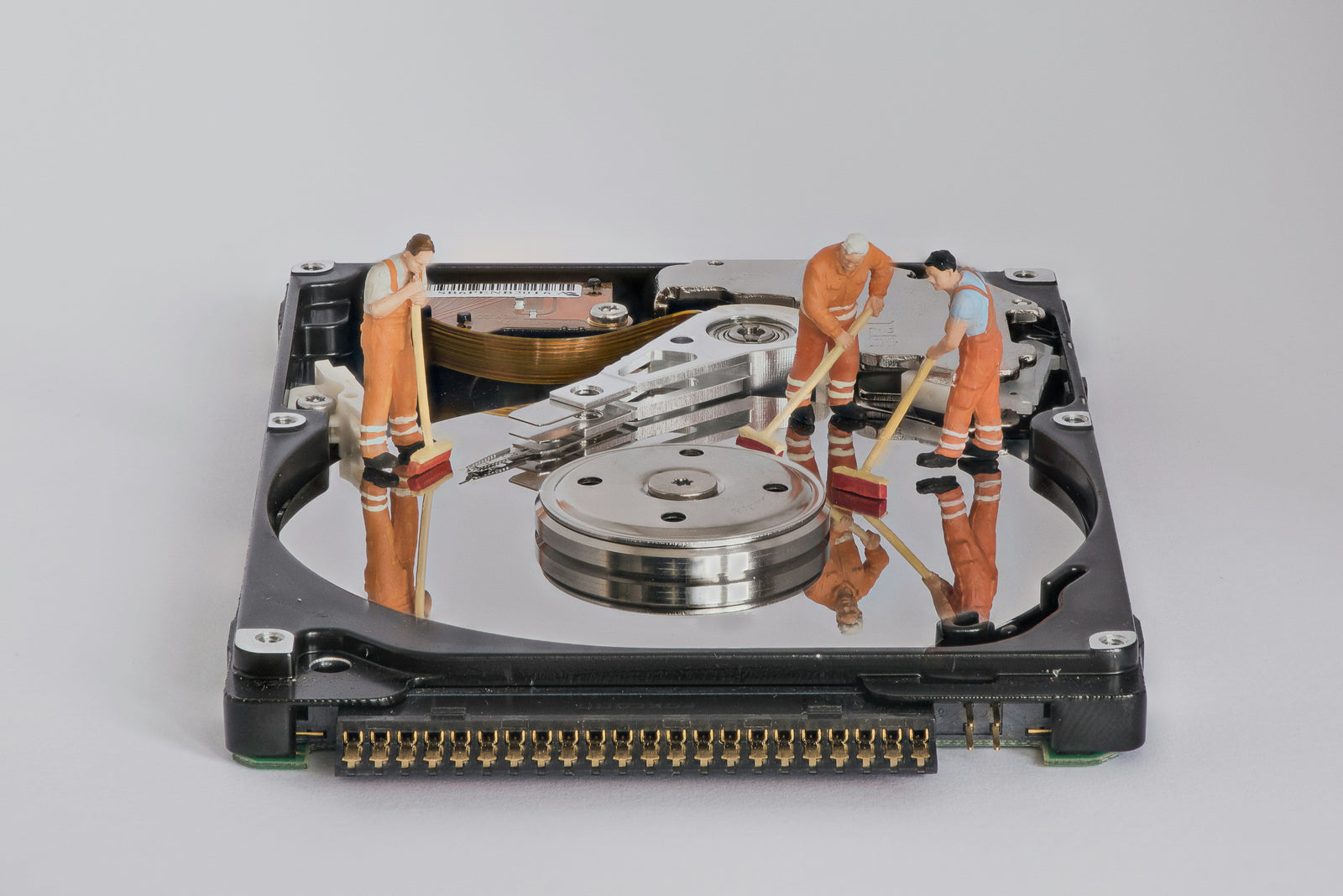I call it my "dead decade". I lived age 18-28 with crippling depression and anxiety, most of the time spent not wanting to be alive. This year, in January, I got sober, which was the first step in helping me identify how bad my depression was and I finally got help and started anti-depressants. The pills, thank goodness, worked, and then I started the new journey unto itself of rediscovering what life and this world was without the weight of depression. I realized, quickly, it was time to make new personal goals and throw out my old journals, because all my old aspirations were created with a tainted, depressed mind.
It was around the same time a therapist friend of mind casually introduced Bullet Journaling to me, and sent me a Buzzfeed article on Bullet Journaling for mental health. I got home and spent the next 48 hours devouring Youtube and Pinterest and Buzzfeed to plan my life a new. It was one of the best things I ever did. I started my bullet journal solely with the intention of monitoring my mental health, and I wanted to share with you the techniques I found most helpful for battling anxiety and depression.
Bullet Journaling saved my brain and my life, and continues to be my North Star and daily companion that goes with me everywhere. I use it religiously all the time to help unpack the moods, emotions, struggles, dreams, and events of my life. Here's what worked for me.
Anxiety Log
I found this exercise to be one of the most powerful things I've ever done if you're looking to break and change a thought pattern. A lot of depression and anxiety come as reoccurring thought patterns that are often brutal, like a car that keeps backing up and slamming into the same wall (you). One of mine was a voice that said, "Kill yourself". It came every day, often multiple times a day, for the past 3-4 years, and it destroyed me. These negative thoughts, without awareness, have the power to run wild and wreck you. My therapist recommended that I notice every time the "kill yourself" thought comes up and mark down exactly what I was doing, where I was, and what was happening. I devoted several pages in my Bullet Journal to this, and every time the "kill yourself" voice came, I'd run to grab my journal. It changed everything. I called it my Anxiety Log, and it was a 3-step process. Here's how it worked.
- As soon as I was aware I was having anxiety or a negative thought pattern I wanted to change, I grabbed my journal and wrote down exactly what that anxiety was.
- Next, I wrote down the trigger; what was happening right before I felt the anxiety. What were the thoughts that led to that anxiety? What was I thinking about specifically, money? Success? Who was I with? What was I doing? Where was I?
- Finally, and maybe the most important part; I wrote a concrete solution or small simple action I could take, that would help me feel better immediately or in the near future.
This process was profoundly monumental and became a speed therapy or mental alchemy; negativity and powerlessness coming in, and positivity and self-empowerment coming out. While depressed or anxious, if you're not paying attention, our thoughts can seem like these omnipotent all powerful truths, that feel mystical, daunting, ethereal, and unconquerable, but this anxiety log helped me dispel that myth completely. The Anxiety Log made the impossible and ethereal conquerable, and it took all the mystery and power out of anxiety, humanizing the demon, in turn putting myself in the position of power. It did this by helping me identify and giving me concrete and quantifiable data to notice where and when I was experiencing anxiety.
I was able to look objectively at a list of a week of anxiety logs and notice, "Oh four times this week I had anxiety that all happened in my bed in the morning or at night. Why am I having anxiety specifically in my bed? What is it about being in bed is triggering to me? Are there things I can change that about?" Then I could plan and change habits or other things in my life accordingly. This helped give me enough space to start taking my first baby steps toward freedom. Plus by thinking of a solution/action, it helped me face anxiety head on, instead of letting it fester or slow burn in me, and then leak out in unfortunate ways. I was able to accept what I felt, acknowledge it and change the pattern. It became like a game almost.
You can practice these three simple steps for any thought pattern you want to change. I've done these same simple three steps for a lot of other thought patterns I want to change like judgment, fear, sadness, loneliness, etc. It helped me bring awareness to how our thoughts are not reality, and most times the thoughts and stories we tell ourselves are just complete bullshit. If we are able to pause, and not believe every thought that comes into our heads, we can start rewriting the stories we tell ourselves and start to become our own hero.
MOOD Box
The singlehandedly most important part of my Bullet Journal is a simple daily box in my weekly calendar that says MOOD. Every single night, before I go to bed, I put my phone away, take out my BuJo, pause, take a deep breath, get quiet, notice how I feel, then reflect on the day and write as honestly as I can, only 4-5 lines.I love the MOOD box because it keeps me honest, reveals blind spots in my thinking, shows me what I'm ignoring in my life, tells me what I'm doing right, what I could be doing better, what I really need to listen to, and gives me tips on how to better take care of myself. The MOOD box gives my heart direction to what it really needs and yearns for, and it most importantly lets me get out all my emotions and put them in the box, put them to rest, and gives me a fresh start for tomorrow. It's my emotional and mental compass.
If there are too many days in a row where my first lines are "I'm tired, or I'm sad", I know I need to double down on self-care or change something about my routine. It keeps me honest. There are some days before I write, my mind thinks, "wow today was terrible", but when I paused to take a deeper look, I realized there were so many more layers to the day, great and bad, but my mind was prewired to instantly only see the doom. The mood box has allowed me more space and honestly to notice how my mind functions when it's sad or depressed, which in turn leads to more clarity. Also being able to look back and revisit what you went through is a gift. It's been so healing to just look back on weeks and months past, and I'm able to see all the ups and down, the growth, change, and progress I've made emotionally, physically, spiritually, and even changes in how I write. Plus it's empowering to realize, I got through all of it and survived!

When you look back, you are able to objectively see how moods fluctuate and wave, which is exactly what they're supposed to do! Some weeks have great days, and some have alternating good, bad, days, and some weeks are just rotten. Plus there's something magical about looking back and seeing how events lead up to each other, where momentum is building and when synchronicity and the universe was beaming. It's helped me realize my emotions and moods are just transitory temporary moments that are always changing and always in motion, which is so helpful to understand when you're struggling with depression, because when you're in it, it seems like you're caught in a never-ending cyclone from hell. Because of that, it's helped me loosen the grip on trying to control my moods, and it's allowed me to handle my feelings and emotions with a certain lightness. I'm allowed to feel anything, have good AND bad days, and write anything in my mood box. The biggest lesson is I don't need to hold onto any of it!
Lastly, it will showcase your journey! If you read my MOOD boxes from April 2019 until now, you'd start with someone who was so scared of life, holding on, afraid of everything, fragile, to someone who is healthy with a brain that works, eager to rebuild a life, and happy to be alive. The Bullet Journal MOOD Box has helped me learn to love, own, and enjoy my own journey. Think of the MOOD Box as the Tails to your Sonic.
Heartwork
When I started anti-depressants, it occurred to me that every previous goal I've had was dreamt while I was depressed and anxious, so I thought it vital to renew my aspirations with a functioning brain. I also realized that most of my past goals had been anxiety and panic attack inducing, that most times made me feel terrible about myself, because they came from my mind, and not my heart. I wanted to change all of this, and coined a section of my journal called Heartwork. These are the goals and desires of my heart, not my maniacal mind. They are heart reminders of who I am, what I'm reaching for, who I've always known I am, without the mental muddiness of depression. They are reminders of what I'm striving toward, the base knowledge of why I'm doing something, along with the positive and correct intentions for certain roles we play.
I dedicated a page each to the different roles I play in life (songwriter, yogi, guitarist, investor, vocalist, what true success means to me, who I know I am in my heart of hearts). Don't think too much about what you will write before hand because it's a practice of tuning in, listening to your soul whisper, rediscovering who you know you are in your heart of hearts, without the mind's involvement. If this feels weird to you, you can start by closing your eyes, taking a deep breath, and ask, what does my mind think I want? Then ask what does my heart want? Followed by what do my gut and instinct want? Don't write what you're supposed to care about, what you think you should care about, or who other people think you should be, and get brutally honest with yourself about this. These pages are reserved just for your heart only, and remember no one has to know or see them. Think about the dreams you had as a kid, and where and when you felt the freest and safe.

I also stress that you write this in your own diction and words. I wrote phrases down in some of my lists that if someone else saw it'd be gibberish, but to me I knew exactly what they mean. Again, the most important thing to note about this is, it's not what the mind thinks; it's what the heart is yearning for, and deeply cares about. There's something magical about writing it down, because you with time, you realize they will start to come true, and you will become that person your heart has always known you are.
Before you write these pages, allot yourself a good chunk of guiltless free time, pick a space you feel comfortable in, do not put ANY pressure on yourself to complete this, and leave your phone behind. Wear clothes you feel most yourself in, buy yourself a small luxury, either a solo lunch date at your favorite spot, or your favorite coffee shop, and get in touch with what your heart and soul yearn for, and what that means to you. Take your time. I did mine over a week or two, wrote in pencil, and then revised. I saw what stuck, and what didn't, then changed accordingly.
Whenever I feel lost or out of touch, I come back to these pages. They are something beautiful to come back to when you feel like you need grounding, or you've lost your way or need reminding of your purpose. Make sure it's inspiring when you read it! Qualities, traits, you actually care deeply about. Also, like you, these pages will eventually change! So be aware of that as well, and with enough stillness you will know when they don't serve you anymore. For me, as I was rebuilding my life post depression, these pages were my home base. While I was digging through the weeds and tending the gardens of depression, I could come back here and remember who I am, and what my heart is working toward, or should I say, returning to.
Habit Tracker
I have a love hate relationship with habit trackers and want to suggest a word of caution before I begin. If you make a monthly habit tracker, do it with no ego and no attachment whatsoever. Emotionally, step the hell back, and if you can't do that, it might not be time for a habit tracker. It's like the Tinder of Bullet Journal. If you can't do it with a lightness and enjoy it, rethink it.
![]()
When I was wildly depressed, I had a "bad" habit of creating goals for myself that were unattainable, because my brain was broken and couldn't think straight. It was total self-sabotage, and when I didn't reach that goal, or it took me longer, I'd devour myself with shame, into a self-hate spiral. When you're depressed, it's so easy to start with a single emotion like sadness, and then cook a 7-layer shit cake that add shame, anger, and fear on top of that. If you're not aware, a habit tracker can add more suffering, but if you're mindful, it can be your best friend.
There IS value to a monthly habit tracker, but if it causes you any discomfort or pain, or makes you feel bad about yourself in any way, stop, and either take a breath, be kind to yourself, and A) ask yourself, "is this a goal or habit my heart wants, or did my mind think it was a good idea?" or B) discard the habit tracker altogether and revisit at a later date. Missed the gym for 9 days straight? You can either say, "Whoops!", and ask what in my life caused that to happen, which can lead to a positive outcome or behavior change. Or you do what most depressives do "I missed 9 days at the gym? My life is over, I hate myself, and I'm practically dead and I don't deserve to be alive" you choose which garden you want to cultivate.
I made a monthly habit tracker, and came to love it, with some tiny bumps along the road. What'd I recommend is starting simple, one to three things you'd like to do daily, or however many times in a month. Maybe one of those things is something you already do. Thereis something fulfilling and accomplishing about to getting to the end of a day and marking a box. Also, the most important part, MAKE THIS WORK JUST FOR YOU. Your daily habits are totally different than mine. All depression and anxiety is different, so what works for you, might not work for me. For me personally, mindfulness, exercise, and yoga have been a huge help for me in fighting off my depression, and those were things I wanted to track. Again, yours can be ANYTHING. I've seen some people mark taking a daily shower as a goal, and hey, if you're down in the dungeon of depression, thatIS a victory.
Whenever I found myself not checking off a certain box for a week or two at a time, I realized two things, either it was something my heart really didn't want, or if it was something very important my heart was avoiding. It kept me honest, or caught me being dishonest. There's value in that. I also used the Habit Tracker extensively used it for habits I wanted to get rid of, and it was equally as helpful cutting meat, sex, coffee, and medication. That being said, the monthly habit tracker can be very exciting and encouraging. JUST HOLD YOURSELF WITH KINDNESS. This isn't meant to be a crucifixion block where you berate yourself, but it's meant to be that little muppet cheerleader on your shoulder egging you on! There are just times, in all of our lives where we fall off our exercise and mediation routines, and it's just part of the cycle. It helped me accept those things, and now because of habit tracker, I've been able to let go of so many more things and ultimately be kinder to myself.
Self Care Guide
I sort of mindlessly copied this page this straight from a Buzzfeed or Pinterest search on Bullet Journaling for mental health and it wound up being a revelation. Turns out is that when I wrote my self care list, the activities I thought were self care, were not self care at all, but just un-special bare minimum maintenance chores.
What I thought of as my self care routine was the equivalent of considering that picking someone up in your car, not saying a word, and then driving them around the block and dropping them off 10 minutes later is the most romantic date you've ever been on.
You'd never do that to someone else, so why would you do that to yourself? It forced me to get honest with, what truly is rest to me? It turned out the "days off" I used to give myself were not rejuvenating days off. They were still fringed with a panic and anxiety and too much phone time.

This is a list that will continue to change and morph, as I keep getting older. Bullet journal revolutionized self-care because it gave me glaringly honest feedback. This page then helped me be so much kinder to myself in the ways that really mattered.
Weekly Therapy Notes
Finally, one thing I've been religiously adamant about this year is taking time after every therapy session to write notes. It's non-negotiable time and I've never missed a beat. Part of learning how to cope with depression and anxiety is doubling down on self-care. After every session on Friday afternoon, I'll walk down to Dune Coffee in Santa Barbara, order the granola with almond milk, put my headphones in and write down a bullet list of all the highlights from that session. It has been invaluable for me, and it also keeps me focused on what energy and goals I'll bring into next week, for my This Week page.
Note from Kyle: This was a long one but I wanted to share as honestly as I could everything that worked for me with Bullet Journal in case it would speak to you. So thank you for reading. Reach out anytime:kylenicolai@gmail.com.
About the Author:
This article was written by Kyle Nicolaides of Beware Of Darkness.
Kyle Nicolaides is a songwriter, avid tea drinker, muppet fan, yogi, and spiritual seeker. He is the voice and writer behind Beware of Darkness. They just released an exciting new single "Bloodlines."






Ashley
July 14, 2025
Thank you for writing this article. It’s one of the most genuine and helpful articles I’ve come across on this topic. I’ve been trying to figure out how I can best document my patterns and experiences to make progress in my metal health journey. These ideas are exactly what I needed.